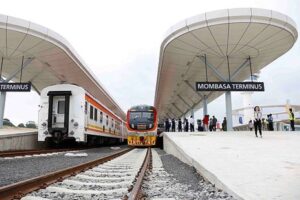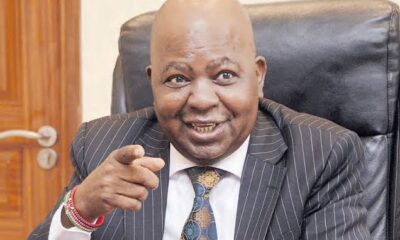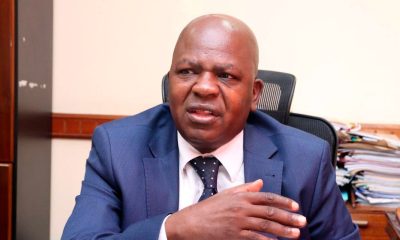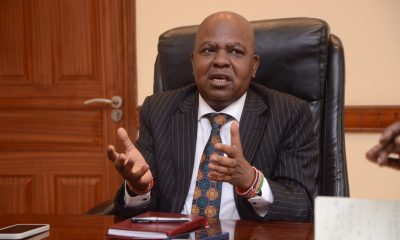Investigations
Kenya Railways MD Philip Mainga: A Wanted Man Now On Activists’ Radar Facing Multiple Corruption Probes
Central to their case is the allegation that Mainga orchestrated a series of irregular procurement deals and questionable leasing arrangements, leading to massive financial losses.
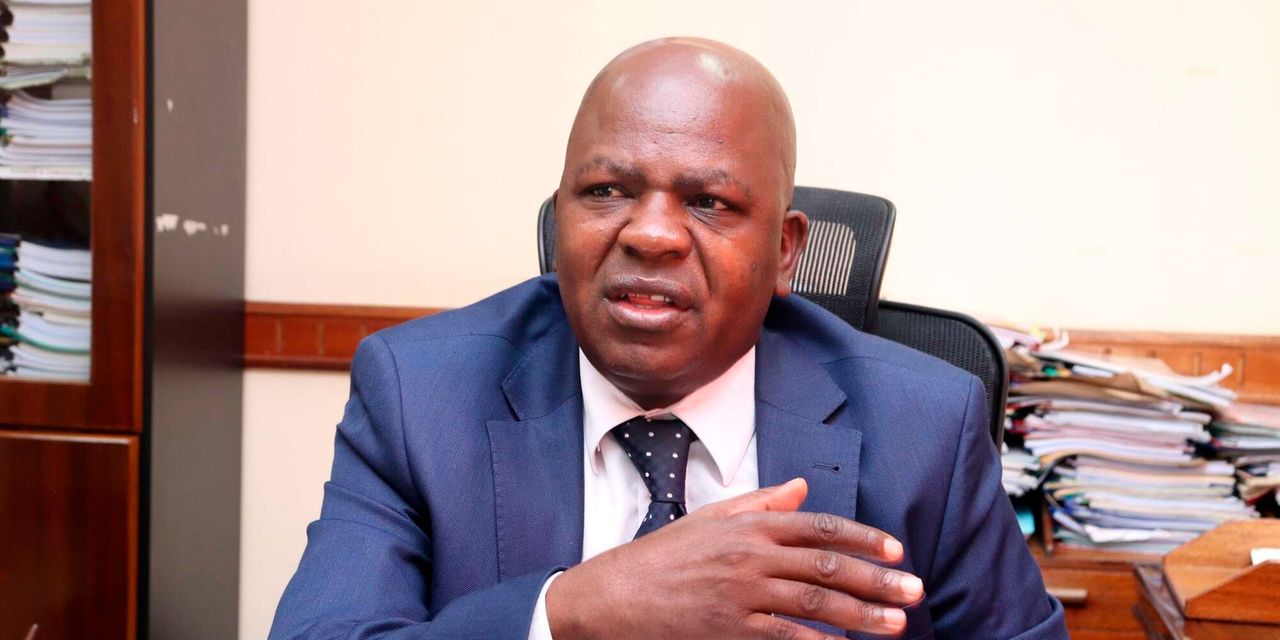
Court activists demand comprehensive investigation into alleged financial mismanagement, land grabbing, and procurement irregularities
Philip Mainga, the embattled Managing Director of Kenya Railways Corporation (KRC), finds himself at the center of mounting legal challenges as activists petition the High Court to compel anti-corruption agencies to launch comprehensive investigations into his conduct.
Two prominent activists, Timothy Rasugu and Julius Chebitok, have moved to court seeking orders compelling the Ethics and Anti-Corruption Commission (EACC) and the Directorate of Criminal Investigations (DCI) to undertake thorough investigations into all financial transactions conducted during Mainga’s tenure at the helm of the state corporation.
High Court Judge Lawrence Mugambi has directed the duo to serve Mainga with court documents as the case gains momentum.
The activists’ petition paints a damning picture of alleged systematic corruption and financial mismanagement that has plagued Kenya Railways under Mainga’s leadership.
Central to their case is the allegation that Mainga orchestrated a series of irregular procurement deals and questionable leasing arrangements, leading to massive financial losses.
The most significant of these involves a Sh150 million tender for Murram supply in the Nairobi-Nanyuki railway rehabilitation project (Tender No. KR/SCM/FRC/003/2019-2020), which allegedly violated public procurement regulations through restricted bidding, bypassing the Sh30 million threshold set by regulations.
Further investigation reveals that contracts worth Sh88.2 million to First Choice General Suppliers Limited and Sh34.5 million each to Mosrach Limited were backdated, with work commencing before formal agreements were signed.
Adding to the complexity, recent reports indicate that the Sh88.2 million deal was allegedly given to a business controlled by Mainga’s long-term fiancée in what investigators describe as an improper process.
Beyond procurement irregularities, Mainga faces serious allegations of land grabbing and illegal property dealings.
The activists claim he has been involved in converting public land to private property, specifically alleging that he was involved in land grabbing at Kileleshwa, converting land belonging to the Corporation and building a private hotel.
The petition further alleges that “The Respondent has also bought public land valued in millions of Kenya shillings in prime Machakos town and build Chocolate City hotel and Chocolate City Supermarket.”
The activists want the National Land Commission to establish the ownership of land where Chocolate City bar, restaurant and supermarket sits, and determine whether the land was acquired lawfully.
Under Mainga’s leadership, over 544 parcels of public land have allegedly been illegally allocated to private individuals, with senators demanding EACC arrest Mainga over alleged illegal property deals.
Financial Hemorrhaging
Perhaps most damaging to Mainga’s reputation is Kenya Railways’ catastrophic financial performance under his watch.
Kenya Railways Corporation slumped into a Sh50.37 billion deficit in the financial year that ended June 2024, topping the list of State agencies whose operational costs outstripped revenues.
This staggering loss has made Kenya Railways the worst-performing state corporation, dwarfing losses of other state entities including the National Health Insurance Fund (Sh3.4 billion), New Kenya Cooperative Creameries (Sh2.4 billion), and Nzoia Sugar (Sh1.1 billion).
The financial crisis deepened following Kenya Railways’ default on a Sh3.5 billion loan, with the debt ballooning to Sh14 billion, including repayments and accrued charges.
The SGR on-lent loan hit Sh737.5 billion in June, up from the Sh539 billion originally borrowed from the China Exim Bank.
Procurement Scandals and Conflict of Interest
The activists’ court filing highlights multiple procurement irregularities, including a controversial tender for general office stationery supply (Tender number KR/SCM/FRC/003/2023-2024).
Internal sources allege irregular award of the tender to proxy companies associated with senior management at the state corporation, with an estimated Sh200 million potentially lost to beneficiaries.
The petition accuses Kenya Railways of disregarding compliance with the Public Procurement and Asset Disposal Act, 2015, particularly Section 62 regarding “Declaration not to engage in corruption.”
Leasing Irregularities
Among the most significant allegations is Mainga’s involvement in illegal land leasing scandals.
He is accused of leasing Makongeni Container Yards in Nairobi for 10 years without board approval, leading to over Sh400 million in lost revenue.
Aside from procurement woes, Mainga is accused of overseeing what is now Kenya’s most financially crippled state corporation.
KRC posted a staggering KSh 50.4 billion net loss this year—dwarfing losses posted by institutions like the NHIF, New KCC, and Nzoia Sugar.
Despite government directives to slash spending on non-core activities, Kenya Railways failed to align with fiscal reforms.
Matters worsened when an Auditor General’s report tabled in Parliament revealed that KRC defaulted on a KSh 3.5 billion loan, which has since ballooned to KSh 14 billion due to interest and penalties.
In response to these allegations, High Court Judge Lawrence Mugambi has directed the petitioners to serve Mainga with all relevant court documents.
The activists are also urging the Public Procurement Regulatory Authority (PPRA) to conduct a special audit into all procurement processes during Mainga’s tenure and have asked the court to order restitution for all lost public funds.
Mainga’s term as Kenya Railways MD officially ended in February 2023, yet the Public Service Commission launched a probe into the secret extension of his term, raising questions about the legitimacy of his continued tenure.
Additional allegations include appointing Benedict Kiema Kavua to a plum position after allegedly taking bribes in a sham recruitment exercise, further demonstrating the breadth of corruption allegations surrounding his leadership.
What the Activists Seek
The petitioners are seeking comprehensive relief from the court, including:
– Orders compelling EACC and DCI to investigate all financial transactions during Mainga’s tenure
– Direction for National Land Commission to establish ownership of disputed properties
– Special audit by Public Procurement Regulatory Authority of all procurement processes
– Restitution and recovery of all public funds lost through fraudulent deals
– Implementation of governance and structural reforms within Kenya Railways
The case against Mainga represents more than individual corruption allegations; it highlights systemic governance failures within Kenya’s state corporations.
Despite government directives to cut costs on non-core activities such as travel, training, and overtime, KR reportedly failed to align its budget with the Kenya Kwanza administration’s fiscal priorities.
As Kenya grapples with mounting public debt and calls for accountability in public service, the Mainga case has become a test of the country’s commitment to fighting corruption in state corporations.
The outcome of these legal proceedings could set important precedents for how corruption cases involving senior public officials are handled.
The High Court is expected to hear the matter in the coming weeks, with all eyes on whether the anti-corruption agencies will be compelled to take decisive action against one of Kenya’s most controversial state corporation chiefs.
Kenya Insights allows guest blogging, if you want to be published on Kenya’s most authoritative and accurate blog, have an expose, news TIPS, story angles, human interest stories, drop us an email on [email protected] or via Telegram
-

 Grapevine2 weeks ago
Grapevine2 weeks agoRussian Man’s Secret Sex Recordings Ignite Fury as Questions Mount Over Consent and Easy Pick-Ups in Nairobi
-

 News1 week ago
News1 week agoTHE FIRM IN THE DOCK: How Kaplan and Stratton Became the Most Scrutinised Law Firm in Kenya
-

 Investigations2 weeks ago
Investigations2 weeks agoMulti-Million Dollar Fraud: Three Kenyans Face US Extradition in Massive Cybercrime Conspiracy
-

 Economy1 week ago
Economy1 week agoIran Demands Arrest, Prosecution Of Kenya’s Cup of Joe Director Director Over Sh2.6 Billion Tea Fraud
-

 Business1 week ago
Business1 week agoA Farm in Kenya’s Rift Valley Ignites a National Reckoning With Israeli Investment
-

 Africa2 weeks ago
Africa2 weeks agoFBI Investigates Congresswoman Ilhan Omar’s Husband’s Sh3.8 Billion Businesses in Kenya, Somalia and Dubai
-

 Grapevine5 days ago
Grapevine5 days agoA UN Director Based in Nairobi Was Deep in an Intimate Friendship With Epstein — He Even Sent Her a Sex Toy
-

 News2 weeks ago
News2 weeks agoTragedy As City Hall Hands Corrupt Ghanaian Firm Multimillion Garbage Collection Tender

